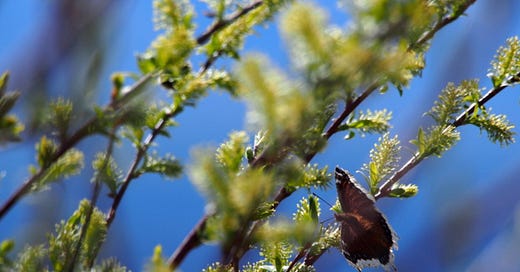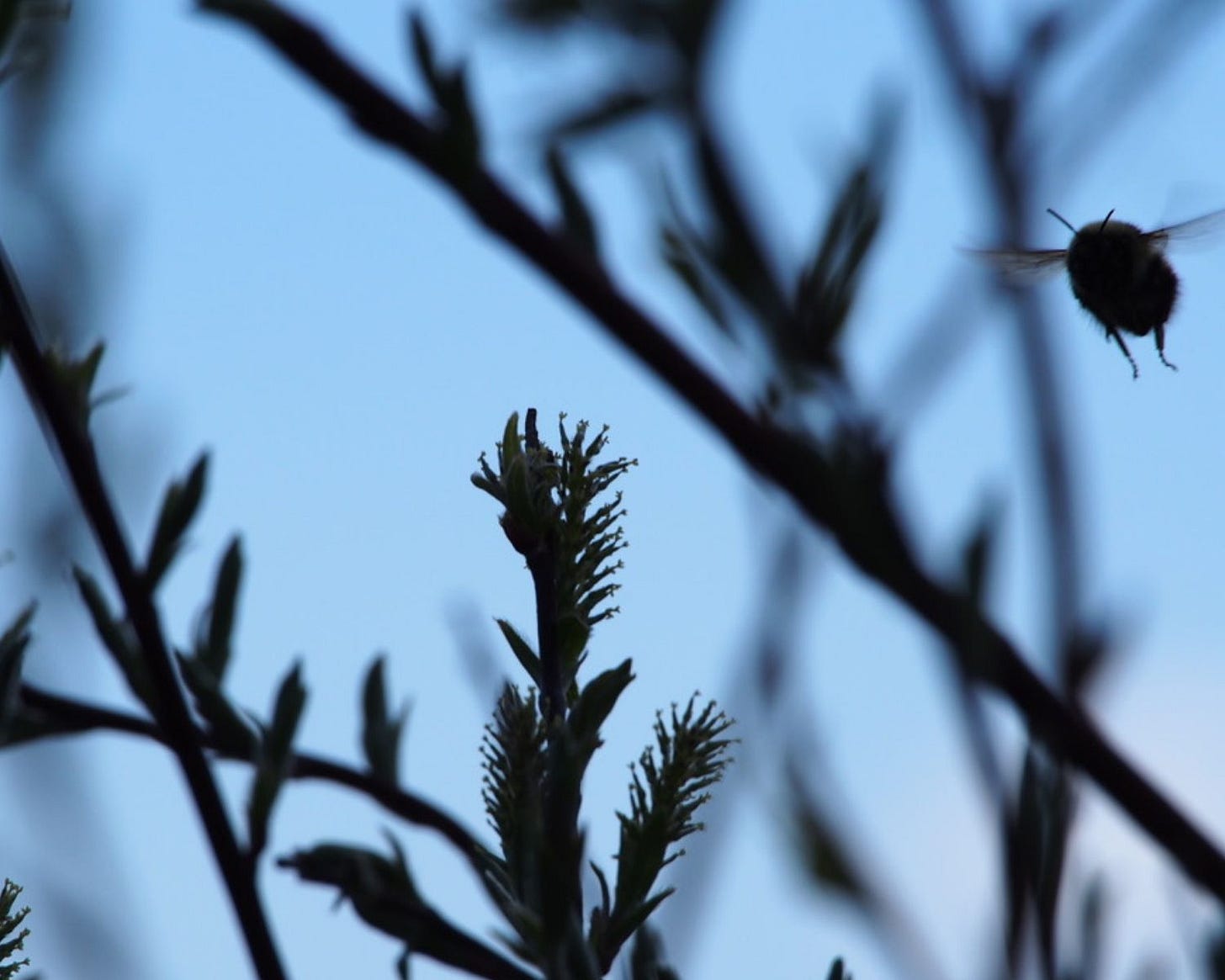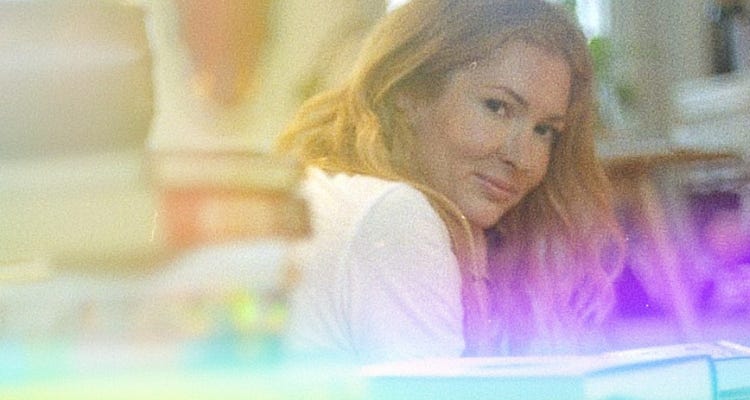The Dawdler #2 - Letting Go
let's loosen up and linger over lovely literature (including an excerpt from a brilliant new book!)
Welcome to the second edition of The Dawdler, a new monthly-ish feature (that will mostly be) for paying subscribers of The Tortoise. Every month I’ll curate and share some lovely things you might like to explore with a cup of something nice.
The hope is that you’ll dip into and out of this list over the coming weeks when you find yourself looking for something slow, sweet, nourishing or delightful to watch/read/listen to. (It’s a good alternative to doom-scrolling!)
If you’re not yet a paid subscriber and would like to receive future editions of The Dawdler, as well as extra posts most Sundays, you can join us for $5AUD a month or $50AUD a year.
The last Dawdler focused on the idea of ferocious joy as an antidote to cynicism. This month it’s all about letting go in order to find things worth holding on to.
In today’s edition, I’ve got an excerpt from Raising Hell, Living Well, the cracking new book by
to share with you, as well as her Ten Tiny Things, but before we dive into either of those, here’s a whole heap of good stuff to sink your teeth into over the coming days.Learning to let go
In case you missed it, I wrote about letting go in this week’s letter, mostly as a way to be okay with the lack of control we have.
Over the past couple of weeks I’ve found myself hurting for the hurt in the world. Laying awake in bed worrying about what we’re stealing from our children. Worrying about what we’ll leave them with. War and division and lies and greed. Short-term, me-first, fear-based thinking. And along with that has come the heaviness of knowing so little of it is in my control.
Ironically, this is also what brought hope back to me — the thing that’s opening me up again. Letting go of the things I can’t control has helped me embrace everything I can.
The actions, the conversations, the choices in how we treat our loved ones, our homes, our communities, the trees and plants and animals around us. In learning to listen and stay open and act out of love instead of fear. These are all within our control. And by embracing their power, they become something far greater. They become the big things.
The comments, emails and texts I received after publishing it have really lifted my heart (thank you all so much), and many of you shared quotes and frameworks that help you when you’re feeling similarly heavy. There’s too many to share here, but I did want to include this one, sent to me by Wendy (thank you, Wendy!) who quoted James Baldwin:
“The sea rises, the light fails, lovers cling to each other, and children cling to us. The moment we cease to hold each other, the moment we break faith with one another, the sea engulfs us and the light goes out.”
—James Baldwin, Nothing Personal
We’re all we’ve got. When we let go of that which we hold onto out of fear, we free our hands to cling to the things that matter most — each other.
Things I’ve read:
10 Questions to ask a teenager to start an important conversation — The Guardian
Open up a discussion on something you want to talk about, but try to make sure it happens naturally – don’t ‘sit them down’ to chat, because that can become very antagonistic. One good ploy, is to have the conversation when you’re side by side* rather than face on.
*I am a huge believer in the power of side-by-side communication, especially for kids, and especially when they think they don’t want to talk. Driving (which we do a lot of), walking, washing the dishes, working out together — they all give the opportunity to talk without feeling like we need to.
The inner state of the average man — Austin Kleon
Austin Kleon always opens my mind to new things — often creativity-related, but also very much life-related. I find myself a bit challenged by him on occasion, and always, always glad to have read his thoughts.
In this post he looks at how men might be able to make their way through loneliness and disconnection, to something more affirming:
Whenever I think that we’re making no progress whatsoever, I think about the fact that I have two friends, grown men my own age, who, unprompted, within the last year, have told me that they loved me. And I told them I loved them back.
It’s a start.
Small Change — The Art of Noticing by Rob Walker
I’m a sucker for tiny details. This post on The Art of Noticing highlights how our attention is under siege, and instead of going Big Picture with the solution, Rob Walker asks instead:
“What’s the smallest change you can notice this week?”
Pep Talk — Maggie Smith
Whatever happens to your work when you send it into the world, with its sometimes treacherous landscapes, is none of your business, really. You made the thing, and now people can make up their own minds about it. Will everyone love it? Probably not. Will everyone hate it? Also, probably not.
But do you love it? Are you proud of it? Do you stand behind your choices? Have you made something uniquely yours?
Be for you first. Create for you first.
I’ve been struggling with creative fear a lot lately (and what is creative fear if not fear of being fully seen, fully alive??) and this post from poet Maggie Smith was what I needed to read. It’s been rolling around in my heart for weeks and just today, I think I actually heard it.
So many books
My sleep has been weird, and I’ve found myself staying awake longer than normal at night. It’s a chicken and the egg type thing though — am I reading more because I’m not sleeping well, or am I staying awake because I want to read more? Who knows!
(Also, you’ll have to forgive me but it’s mostly fiction and, of that, mostly fantasy. That’s my jam.)
The Shadow and Bone trilogy by Leigh Bardugo. I’m not quite finished Book 3 yet but I’ve really, really enjoyed the whole thing. Six of Crows is up next.)
Holly by Stephen King. Creepy as hell and a return to King’s favourite character, Holly Gibney. I love her and I love that SK seems to be getting sentimental. (Not that it stops him from writing the most disturbing stuff, but there’s a softness to some of his more recent work that I love. Case in point: Fairy Tale — one of my favourite books of the year.)
Lefthanded Booksellers of London by Garth Nix. I think I need to re-read this one. I’ve found myself thinking about it a lot, which tells me there’s something more to discover in it.
The Way Home: Tales from a life without technology by Mark Boyle. Our mate Andy (friend of the show) lent this to me and while I’ve only just started it, I like the unapologetic nature of Boyle’s experiment. It seems like the all-in kind of thing I’d throw myself into.
Raising Hell, Living Well by Jessica Elefante*. A no-holds-barred look at influence and how it affects us both in the wielding and the receiving of it. I once described Jess as someone with a gold plated bullshit detector and I meant it. She applies it to everything in this book, including herself, and we’d all be richer for reading it.
*There’s a chunky excerpt of RHLW at the end of today’s post. Make sure you read through to take a look.*
Things I’ve listened to
Jess Elefante is leading the analog rebellion — The Slow Home Podcast (RIP)
Slow creativity with Jess Elefante - The Slow Home Podcast
Okay, truth be told, I haven’t listened to these because I don’t listen to my own podcast. It’s the audio equivalent of nails down a chalkboard for me. Physically painful. BUT these were among my favourite episodes to record and given that Jess is the woman of the moment, I wanted to point you in the direction of these two really great conversations. The first is from 2017 (babies!) where we talk about living counter-culturally. The second is from 2021 and we dive into the commercialisation of slow living. It’s a cool snapshot of our personal evolutions, especially when paired with the excerpt from her book (found below).
Jonathan Van Ness — Armchair Expert
I love JVN, but this episode of Armchair Expert with them made me so sad. To hear their pain and exhaustion and heartbreak was terrible. I’ve thought about it a lot.
Paul F. Tompkins, Erin Whitehead and John Hartman — Comedy Bang Bang
If you like ridiculous (like, utterly and totally, childishly ridiculous) humour, this episode of Comedy Bang Bang is for you. It had me giggling while weeding the garden. I love listening to Paul F. Tomkins laugh.
How to organise your writing — Writing Excuses
This episode of Writing Excuses was pretty great – especially how to wrangle big amounts of information when writing a book.
Ten Tiny Things with Jess Elefante
Many of you already know her, but Jess Elefante is a writer and bullshit artist who has spent the last few decades examining what it means to be human in our modern world. She writes a Substack called
Before that though, a very brief introduction. As I mentioned earlier, I love tiny details, so here are ten tiny things worth noticing, with my mate Jess.
Can you share with us a recent favourite:
Meal: Pizza.
Book: Dry Humping by Tawny Lara, though I'm not sober I'm curious about the cultural influence of alcohol and this read was chefs kiss.
Tiny detail: the copper highlights of Beau's hair as we transition to fall.
Sunset: A bike ride with the family in Maine. A race to beat the sun but a true "simple living" moment.
Awe-inspiring experience: Watching my son read his dedication in my book I wrote for him.
Place: Brooklyn. It's my favorite time of the year here. Stoop season. Bugs gone, no humidity, leaves falling.
Tree: Willow
Word: Purple. Most fun word to say
Sound: If I can't have silence then I choose Hays's laugh when Beau's pants fell down while walking
Drink: It's merlot season.
Excerpt from Raising Hell, Living Well
Without further ado, here’s an edited excerpt from Jess’ new book.
Unplugged and Loved: (or living with purpose everyday instead of as an end goal)
When you are a truly bad influence, you can be so bad, you trick yourself.
It's taken me almost a decade to realize that Folk Rebellion—the brand I created theoretically to help others unplug and connect to what's real—was born, thrived, and died because of my unhappy marriage. I was grasping for a sense of fulfilment but also an escape from my everyday life. If I could stay busy enough, helping others find happiness, then maybe I could ignore what was really going on in my own life.
Coming to terms with the truth crystallized how I would live my life going forward.
I will not take away from the fact that I truly was "driven by a mission to raise hell for living well in real life (#IRL), encouraging people to become mindful of the technology they use," as stated in the company's press release. But understanding how influence works—through my lens now—has given me the hindsight to see my true motivations clearly. Looking back from my standpoint today, and realizing I had an enormous need for something to pour myself into as a way of avoiding my reality, I know I wasn't championing a cause purely for honorable reasons no matter how much I truly believed in it. That reality check has been both pivotal and sobering.
At the time I created Folk Rebellion, I was unwell. And that unwellness laid the groundwork for my creative baby, Folk Rebellion. I had convinced myself that my physical and mental fracturing was due to the negative impact of tech—and I stand by my beliefs about the dangers of a nonstop digital dystopia. But I see now that it wasn't entirely tech's fault, as I had believed, raged openly about, and built a business upon.
My previous career was very fast-paced and kept me almost wholly online. As an award-winning brand strategist and creative director for rapidly growing companies, I built digital ecosystems and community through storytelling and communications. My background in the online space gave me a perspective not many on the inside were willing to voice at the time.
I am still, as I like to say, a recovering strategist. It took many years and a million tweets, status updates, emails, and living underneath a waterfall of data for my brain to finally give out. When I had my great awakening about the influence the internet, digital and hustle culture, and corporate America had on me, I was able to muster the courage to unplug from it all, almost instantly. (Sometimes my more impulsive side works in my favor.) I realized that not only was the time online making me sick, but I was also living under the thumb of a culture that told me that incessant screen time was the secret to success and possibly even fulfilment.
So at first, I did what I knew how to do best: I created a lifestyle brand in the hopes that I could positively influence a world of consumers into waking up to the realities we were facing.
The catalyst for starting Folk Rebellion was prioritizing my own mental health, but my impulse to run away from myself, my emotions, and my reality by diving headfirst into the project helped it flourish. Ultimately, I wasn’t actually taking my own advice. I was killing myself while preaching to others. Instead of sneering at the wreckage of my marriage, I was sneering at the wreckage of our society—and that was somehow easier.
It was a welcome distraction.
Eventually, after my health began to suffer again and I collapsed at Logan Airport, I had no choice but to face the truth—about my intentions, about my state of mind, about my marriage. While my relationship might have once worked, it was no longer serving either of us. It was time to make a clean break from many elements of my old life and that included shutting down Folk Rebellion.
When I looked hard—and honestly—at the influences driving my motivations, I could see a mixed bag of iffy intentions. All the achievement in the world didn't matter because the hole I was trying to fill still remained. I was still trying to succeed at all costs, ignoring my own values. When the creativity was replaced with accolades and the joy was diminished by to-do lists, I decided to step back and practice what I was preaching. What remained was myself, my unhappiness, and a newfound perspective. I had to walk the walk and talk the talk.
I thought I was on the path, but really, I was only nearing it—still caught up in the outside influences in my life and someone else's metric for success. A great and easy way to distinguish between intrinsic and extrinsic motivations is to ask yourself who is defining your success. (In life or in marriage.)
With Folk Rebellion, I really truly believed I could make a difference. I thought I was using my powers for good—and, sure, that I could make a buck while doing it. Fundamentally though, I was recreating the same toxicity I had been living with for the previous decade the internet as a megaphone, busyness, status, ego, influencing, lifestyle branding, consumerism, and more. I was such a bad influence that I had influenced myself. But this time it wasn't on behalf of someone else; it was me my idea, my name, my brand, my business. This is what can happen when we play into the bad influence: We end up playing, and hurting, not only others, but ourselves.
When I closed it down, I wrote one final post in February 2020:
"Okay. I think that does it!" I wrote. "Life goes round. We succeed. We fail. We hang on by a rung. We open, close, and shed. And sometimes we arrive right back where we started from. Twenty years ago I moved to Brooklyn, quite literally around the corner from where I now live, to become a starving artist. Better late than never."
You can find out more about Raising Hell, Living Well here, or head to your local bookshop and pick up a copy.
In the meantime though, I hope you enjoy the rest of your weekend. Here’s to finding a little time to loosen our grip.
Much love,
Brooke xx










This was so nice to read, Brooke. Thank you!
Brooke, thank you so much for always being my friend from far away. Some day we will spend a lot of time, slow time, offline and together. Until then know that I'm hugging you from here.